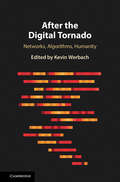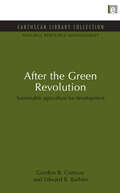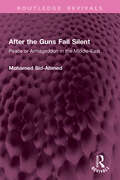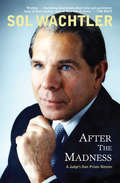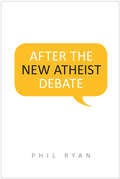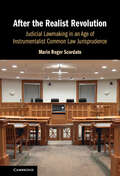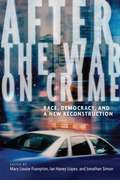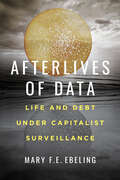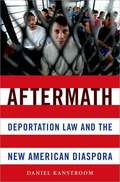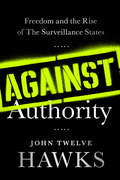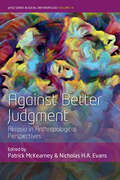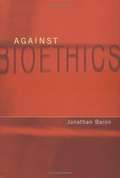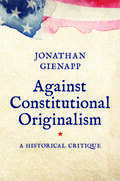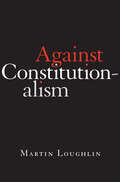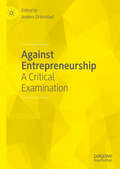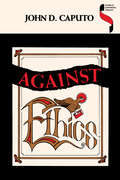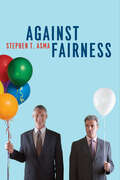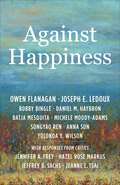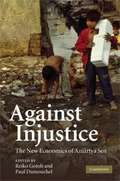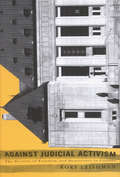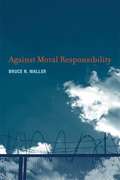- Table View
- List View
After the Digital Tornado: Networks, Algorithms, Humanity
by Kevin WerbachNetworks powered by algorithms are pervasive. Major contemporary technology trends—Internet of Things, Big Data, Digital Platform Power, Blockchain, and the Algorithmic Society—are manifestations of this phenomenon. The internet, which once seemed an unambiguous benefit to society, is now the basis for invasions of privacy, massive concentrations of power, and wide-scale manipulation. The algorithmic networked world poses deep questions about power, freedom, fairness, and human agency. The influential 1997 Federal Communications Commission whitepaper “Digital Tornado” hailed the “endless spiral of connectivity” that would transform society, and today, little remains untouched by digital connectivity. Yet fundamental questions remain unresolved, and even more serious challenges have emerged. This important collection, which offers a reckoning and a foretelling, features leading technology scholars who explain the legal, business, ethical, technical, and public policy challenges of building pervasive networks and algorithms for the benefit of humanity. This title is also available as Open Access on Cambridge Core.
After the Green Revolution: Sustainable Agriculture for Development (Natural Resource Management Set)
by Edward B. Barbier Gordon R. Conway'The Green Revolution' of the 60's and 70's produced immense gains in food cereal production in the Third World. But there are huge problems in the 'post-revolutionary' era: farmers with small or marginal holdings have benefited less than wealthier farmers; intensive mono-cropping has made production more susceptible to environmental stresses and shocks. Now there is evidence of diminishing returns from intensive and intensively chemical agricultural production. What is needed is a new approach, equally revolutionary, but different in its ideas and style. The authors set out what they mean by 'sustainable' agriculture in the new era and look at the effects of international economic restraints and of national policies on the kind of development they see as necessary. They chart a path for sustainable livelihoods for Third World farmers enmeshed by forces outside their control. They describe methods of evaluating and resolving the tough trade-offs all levels of intervention, from international trade down to the individual farm. This book cannot provide all the answers, but it does indicate what international conditions we need to be aware of, what national policies we need to advocate and what approaches at the local level we need to adopt to ensure the goal of agricultural sustainability. Originally published in 1990
After the Guns Fall Silent: Peace or Armageddon in the Middle-East (Routledge Revivals)
by Mohamed Sid-AhmedFirst published in 1976, After the Guns Fall Silent is an important Arab statement on the Middle East crisis. The central theme is that the October war and détente fundamentally changed the basis of the conflict. The Arab military success and the impact of the oil weapon established a parity between Arab quantity and Israel quality. This new sense of equality has forced both sides into contemplating dialogue rather than unyielding confrontation. The author also predicts that the Palestinian issue is expected to become even more explosive as their advance in diplomatic stature has not produced any political or territorial gain and their struggle has become a world inspiration for the revolt of the dispossessed against the affluent. This book will be of interest to students of history, political science, international relations and Middle Eastern studies.
After the Madness: A Judge's Own Prison Memoir
by Sol WachtlerStory of a New York state supreme court judge and how his career was destroyed by drugs and severe mental illness. Wachtler here publishes a journal telling of his prison experience and the events that led up to it.
After the Madness: A Judge's Own Prison Memoir
by Sol WachtlerDriving down the Long Island Expressway in November of 1992, Sol Wachtler was New York&’s chief judge and heir apparent to the New York governorship. Suddenly, three van loads of FBI agents swerved in front of him—bringing his car and his legal career to a halt. Wachtler's subsequent arrest, conviction, and incarceration for harassing his longtime lover precipitated a media feeding frenzy, revealing to the world his struggles with romantic attachment, manic depression, and drug abuse.In this, his prison diary, Wachtler reveals the stark reality behind his vertiginous fall from the heights of the legal establishment to the underbelly of the criminal justice system. Sentenced to a medium security prison in Butner, North Carolina, Wachtler is stabbed by an unseen assailant, berated by prison guards, and repeatedly placed in solitary confinement with no explanation. Moreover, as a prisoner he confronts firsthand the inequities of a system his judicial rulings helped to construct and befriends the type of people he once sentenced.With unflinching honesty, Wachtler draws on his unique experience of living life on both sides of the bench to paint a chilling portrait of prison life interwoven with a no‑holds‑barred analysis of the shortcomings of the American legal justice system.
After the New Atheist Debate
by Phil RyanThe first decade of the twenty-first century saw a number of best-selling books which not only challenged the existence of god, but claimed that religious faith was dangerous and immoral. The New Atheists, as writers such as Richard Dawkins, Christopher Hitchens, Sam Harris, and Daniel Dennett have become known, sparked a vicious debate over religion's place in modern society.In After the New Atheist Debate, Phil Ryan offers both an elegant summary of this controversy and a path out of the cul-de-sac that this argument has become. Drawing on the social sciences, philosophy, and theology, Ryan examines the claims of the New Atheists and of their various religious and secular opponents and finds both sides wanting.Rather than the mutual demonization that marks the New Atheist debate, Ryan argues that modern society needs respectful ethical dialogue in which citizens present their points of view and seek to understand the positions of others. Lucidly written and clearly argued, After the New Atheist Debate is a book that brings welcome clarity and a solid path to the often contentious conversation about religion in the public sphere.
After the Paris Attacks: Responses in Canada, Europe, and around the Globe
by Stephen J. Toope Edward M. IacobucciThe violent attacks on journalists at Charlie Hebdo and shoppers in a Jewish supermarket in Paris in January 2015 raise important questions concerning security, terrorism, and the role of the media in fostering public debate about multiculturalism and freedom of expression. After the Paris Attacks brings together a group of leading scholars, journalists, and political observers to explore how the world reacted to these events and to examine what opportunities exist for a saner and safer future. This timely, interdisciplinary volume presents perspectives from experts in fields such as law, political science, philosophy, and international relations, as well as from the media, offering penetrating insights into how the world can and should respond to the challenge of recent events.
After the Realist Revolution: Judicial Lawmaking in an Age of Instrumentalist Common Law Jurisprudence
by Marin Roger ScordatoAfter the Realist Revolution extends the existing academic study of American common law into new and previously unexplored areas. Marin Scordato examines the conventional understanding of appellate court lawmaking and the profound change in the common understanding of that activity that occurred during the mid-twentieth century. Scordato argues that this change in the conventional account of common law can be best understood as an authentic paradigm shift, akin to those described by Thomas Kuhn in The Structure of Scientific Revolutions. The book also sheds light on the ways in which the current instrumentalist approach to appellate court lawmaking is influenced and, in some respects, compromised by the structures and procedures that were created during the prior formalist era. Thorough and insightful, After the Realist Revolution is an ideal resource for legal scholars and general readers interested in the nature and evolution of American common law.
After the War on Crime: Race, Democracy, and a New Reconstruction
by Mary Louise Frampton, Ian Haney López, and Jonathan SimonSince the 1970s, Americans have witnessed a pyrrhic war on crime, with sobering numbers at once chilling and cautionary. Our imprisoned population has increased five-fold, with a commensurate spike in fiscal costs that many now see as unsupportable into the future. As American society confronts a multitude of new challenges ranging from terrorism to the disappearance of middle-class jobs to global warming, the war on crime may be up for reconsideration for the first time in a generation or more. Relatively low crime rates indicate that the public mood may be swinging toward declaring victory and moving on.However, to declare that the war is over is dangerous and inaccurate, and After the War on Crime reveals that the impact of this war reaches far beyond statistics; simply moving on is impossible. The war has been most devastating to those affected by increased rates and longer terms of incarceration, but its reach has also reshaped a sweeping range of social institutions, including law enforcement, politics, schooling, healthcare, and social welfare. The war has also profoundly altered conceptions of race and community.It is time to consider the tasks reconstruction must tackle. To do so requires first a critical assessment of how this war has remade our society, and then creative thinking about how government, foundations, communities, and activists should respond. After the War on Crime accelerates this reassessment with original essays by a diverse, interdisciplinary group of scholars as well as policy professionals and community activists. The volume's immediate goal is to spark a fresh conversation about the war on crime and its consequences; its long-term aspiration is to develop a clear understanding of how we got here and of where we should go.
Afterlives of Data: Life and Debt under Capitalist Surveillance
by Mary F.E. EbelingWhat our health data tell American capitalism about our value—and how that controls our lives.Afterlives of Data follows the curious and multiple lives that our data live once they escape our control. Mary F. E. Ebeling's ethnographic investigation shows how information about our health and the debt that we carry becomes biopolitical assets owned by healthcare providers, insurers, commercial data brokers, credit reporting companies, and platforms. By delving into the oceans of data built from everyday medical and debt traumas, Ebeling reveals how data about our lives come to affect our bodies and our life chances and to wholly define us.Investigations into secretive data collection and breaches of privacy by the likes of Cambridge Analytica have piqued concerns among many Americans about exactly what is being done with their data. From credit bureaus and consumer data brokers like Equifax and Experian to the secretive military contractor Palantir, this massive industry has little regulatory oversight for health data and works to actively obscure how it profits from our data. In this book, Ebeling traces the health data—medical information extracted from patients' bodies—that are digitized and repackaged into new data commodities that have afterlives in database lakes and oceans, algorithms, and statistical models used to score patients on their creditworthiness and riskiness. Critical and disturbing, Afterlives of Data examines how Americans' data about their health and their debt are used in the service of marketing and capitalist surveillance.
Aftermath: Deportation Law and the New American Diaspora
by Daniel KanstroomSince 1996, when new, harsher deportation laws went into effect, the United States has deported millions of noncitizens back to their countries of origin. While the rights of immigrants-with or without legal status--as well as the appropriate pathway to legal status are the subject of much debate, hardly any attention has been paid to what actually happens to deportees once they "pass beyond our aid. " In fact, we have fostered a new diaspora of deportees, many of whom are alone and isolated, with strong ties to their former communities in the United States. Daniel Kanstroom, author of the authoritative history of deportation, Deportation Nation, turns his attention here to the current deportation system of the United States and especially deportation's aftermath: the actual effects on individuals, families, U. S. communities, and the countries that must process and repatriate ever-increasing numbers of U. S. deportees. Few know that once deportees have been expelled to places like Guatemala, Cambodia, Haiti, and El Salvador, many face severe hardship, persecution and, in extreme instances, even death. Addressing a wide range of political, social, and legal issues, Kanstroom considers whether our deportation system "works" in any meaningful sense. He also asks a number of under-examined legal and philosophical questions: What is the relationship between the "rule of law" and the border? Where do rights begin and end? Do (or should) deportees ever have a "right to return"? After demonstrating that deportation in the U. S. remains an anachronistic, ad hoc, legally questionable affair, the book concludes with specific reform proposals for a more humane and rational deportation system.
Against Authority: Freedom and the Rise of the Surveillance States
by John Twelve HawksIn both his novels and in his 2005 essay, How We Live Now, John Twelve Hawks was one of the first authors to warn us about the growing power of surveillance technology. Now he has written a personal and controversial book that shows how our lives are watched and analyzed by governments and international corporations. In a world in which our actions can be monitored by a computerized grid of social control, is there anything we can do to defend our freedom?
Against Better Judgment: Akrasia in Anthropological Perspectives (WYSE Series in Social Anthropology #14)
by Patrick McKearney Nicholas H.A. EvansAnthropologists have long explained social behaviour as if people always do what they think is best. But what if most of these explanations only work because they are premised upon ignoring what philosophers call 'akrasia' – that is, the possibility that people might act against their better judgment? The contributors to this volume turn an ethnographic lens upon situations in which people seem to act out of line with what they judge, desire and intend. The result is a robust examination of how people around the world experience weaknesses of will, which speaks to debates in both the anthropology of ethics and moral philosophy.
Against Bioethics
by Jonathan BaronGovernments, health professionals, patients, research institutions, and research subjects look to bioethicists for guidance in making important decisions about medical treatment and research.
Against Constitutional Originalism: A Historical Critique (Yale Law Library Series in Legal History and Reference)
by Jonathan GienappA detailed and compelling examination of how the legal theory of originalism ignores and distorts the very constitutional history from which it derives interpretive authority Constitutional originalism stakes law to history. The theory’s core tenet—that the U.S. Constitution should be interpreted according to its original meaning—has us decide questions of modern constitutional law by consulting the distant constitutional past. Yet originalist engagement with history is often deeply problematic. And now that a majority of justices on the U.S. Supreme Court champion originalism, the task of scrutinizing originalists’ use and abuse of history has never been more urgent. In this comprehensive and novel critique of originalism, Jonathan Gienapp targets originalists’ unspoken assumptions about the Constitution and its history. Originalists are committed to recovering the Constitution laid down at the American Founding, yet they often assume that the Constitution is fundamentally modern. Rather than recovering the original Constitution, they project their own understandings onto it, assuming that eighteenth-century constitutional thinking was no different than their own. They take for granted what it meant to write a constitution down, what law was, how it worked, and where it came from, and how a constitution’s meaning was fixed. In the process, they erase the Constitution that eighteenth-century Americans in fact created. By understanding how originalism fails, we can better understand the Constitution that we have.
Against Constitutionalism
by Martin LoughlinA critical analysis of the transformation of constitutionalism from an increasingly irrelevant theory of limited government into the most influential philosophy of governance in the world today. Constitutionalism is universally commended because it has never been precisely defined. Martin Loughlin argues that it is not some vague amalgam of liberal aspirations but a specific and deeply contentious governing philosophy. An Enlightenment idea that in the nineteenth century became America’s unique contribution to the philosophy of government, constitutionalism was by the mid-twentieth century widely regarded as an anachronism. Advocating separated powers and limited government, it was singularly unsuited to the political challenges of the times. But constitutionalism has since undergone a remarkable transformation, giving the Constitution an unprecedented role in society. Once treated as a practical instrument to regulate government, the Constitution has been raised to the status of civil religion, a symbolic representation of collective unity. Against Constitutionalism explains why this has happened and its far-reaching consequences. Spearheaded by a “rights revolution” that subjects governmental action to comprehensive review through abstract principles, judges acquire greatly enhanced power as oracles of the regime’s “invisible constitution.” Constitutionalism is refashioned as a theory maintaining that governmental authority rests not on collective will but on adherence to abstract standards of “public reason.” And across the world the variable practices of constitutional government have been reshaped by its precepts. Constitutionalism, Loughlin argues, now propagates the widespread belief that social progress is advanced not through politics, electoral majorities, and legislative action, but through innovative judicial interpretation. The rise of constitutionalism, commonly conflated with constitutional democracy, actually contributes to its degradation.
Against Dharma: Dissent in the Ancient Indian Sciences of Sex and Politics (The Terry Lectures Series)
by Wendy DonigerAn esteemed scholar of Hinduism presents a groundbreaking interpretation of ancient Indian texts and their historic influence on subversive resistance Ancient Hindu texts speak of the three aims of human life: dharma,artha, and kama. Translated, these might be called religion, politics, and pleasure, and each is held to be an essential requirement of a full life. Balance among the three is a goal not always met, however, and dharma has historically taken precedence over the other two qualities in Hindu life. Here, historian of religions Wendy Doniger offers a spirited and close reading of ancient Indian writings, unpacking a long but unrecognized history of opposition against dharma. Doniger argues that scientific disciplines (shastras) have offered lively and continuous criticism of dharma, or religion, over many centuries. She chronicles the tradition of veiled subversion, uncovers connections to key moments of resistance and voices of dissent throughout Indian history, and offers insights into the Indian theocracy’s subversion of science by religion today.
Against Entrepreneurship: A Critical Examination
by Anders ÖrtenbladThis book explores whether there is reason to be against entrepreneurship. Just like literature on the darker sides of entrepreneurs and entrepreneurship, the book is an answer to the one-sided, overly positive and uncritical image of entrepreneurship. The “twist” in this book, in comparison with literature on dark sides of entrepreneurship, is to explore being against entrepreneurship. From various perspectives such as lexical semantics, Marxism, philosophy of science and psychology, the contributors contemplate on why there may be reason to be against entrepreneurship discourse as well as entrepreneurship practice. Some chapters are based on first-hand empirical data, others are conceptual. The main overall conclusion is that there are some strong arguments for being against entrepreneurship discourse, as well as for being against certain aspects of entrepreneurship practice. Before it is reasonable to be against entrepreneurship practice in total, a convincing and practicable alternative needs to be developed. This book will be valuable reading for entrepreneurship scholars, as well as academics working in the fields of business ethics, (critical) management, and international business.
Against Ethics: Contributions to a Poetics of Obligation with Constant Reference to Deconstruction (Studies in Continental Thought)
by John D. CaputoA brilliant and witty postmodern critique of ethics, framed as a contemporary restaging of Kierkegaard’s Fear and Trembling.John D. Caputo undertakes a passionate, poetic, and satiric search for the basis of an ethics in the postmodern situation. Restaging Kierkegaard’s Fear and Trembling, Caputo defends the notion of obligation without ethics, of responsibility without the support of ethical foundations. Retelling the story of Abraham and Isaac, he strikes the pose of a postmodern-day Johannes de Silentio, accompanied by communications from such startling figures as Johanna de Silentio, Felix Sineculpa, and Magdalena de la Cruz. In dialogue with the thought of Kierkegaard, Nietzsche, Derrida, and Lyotard, Caputo forges a challenging, original account of what is possible and what is not possible for a continentalist ethics today.“Against Ethics is a bold work. . . . A counterethics whose multiple voices will be heard long after the trivializing arguments of many analytic ethicists have vanished and the arcane formulations of many postmoderns have been jettisoned.” —Edith Wyschogrod“Caputo provides a brilliant new analysis of the limits of ethics. . . . Essential reading for anyone concerned with the philosophical issues raised in postmodernity.” —Drucilla Cornell“One of the most important works on philosophical ethics written in recent years. . . . Caputo speaks with a passion and concern that are rare in academic philosophy.” —Mark C. Taylor“Against Ethics is beautifully written, clever, learned, thought-provoking, and even inspiring.” —Theological Studies“Writing in the form of his ideas, Caputo offers the reader a truly exquisite reading experience. . . . His iconic style mirrors a truly refreshing honesty that draws the reader in to play.” —Quarterly Journal of Speech
Against Fairness
by Stephen T. Asma“Mr. Asma offers a rightly critical diagnosis of our obsession with egalitarianism.” —The Wall Street JournalIn our zealous pursuit of fairness, we have banished our urges to like one person more than another, one thing over another, hiding them away as dirty secrets of our humanity. In Against Fairness, polymath philosopher Stephen T. Asma drags them triumphantly back into the light. Through playful, witty, but always serious arguments and examples, he vindicates our unspoken and undeniable instinct to favor, making the case that we would all be better off if we showed our unfair tendencies a little more kindness—indeed, if we favored favoritism.Conscious of the egalitarian feathers his argument is sure to ruffle, Asma makes his point by synthesizing a startling array of scientific findings, historical philosophies, cultural practices, analytic arguments, and a variety of personal and literary narratives to give a remarkably nuanced and thorough understanding of how fairness and favoritism fit within our moral architecture. Drawing on thinkers from Confucius to Tocqueville to Nietzsche, he reveals how we have confused fairness with more noble traits, like compassion and open-mindedness. He dismantles a number of seemingly egalitarian pursuits, from classwide Valentine’s Day cards to civil rights, to reveal the envy that lies at their hearts, going on to prove that we can still be kind to strangers, have no prejudice, and fight for equal opportunity at the same time we reserve the best of what we can offer for those dearest to us.Watch an animated book trailer here: http://www.youtube.com/watch?v=GjPhTQ9zi5Q
Against Happiness
by Owen Flanagan Batja Mesquita Anna Sun Joseph E. LeDoux Daniel M. Haybron Michele Moody-Adams Bobby Bingle Songyao Ren Yolonda Y. WilsonThe “happiness agenda” is a worldwide movement that claims that happiness is the highest good, happiness can be measured, and public policy should promote happiness. Against Happiness is a thorough and powerful critique of this program, revealing the flaws of its concept of happiness and advocating a renewed focus on equality and justice.Written by an interdisciplinary team of authors, this book provides both theoretical and empirical analysis of the limitations of the happiness agenda. The authors emphasize that this movement draws on a parochial, Western-centric philosophical basis and demographic sample. They show that happiness defined as subjective satisfaction or a surplus of positive emotions bears little resemblance to the richer and more nuanced concepts of the good life found in many world traditions. Cross-cultural philosophy, comparative theology, and social and cultural psychology all teach that cultures and subcultures vary in how much value they place on life satisfaction or feeling happy. Furthermore, the ideas promoted by the happiness agenda can compete with rights, justice, sustainability, and equality—and even conceal racial and gender injustice.Against Happiness argues that a better way forward requires integration of cross-cultural philosophical, ethical, and political thought with critical social science. Ultimately, the authors contend, happiness should be a secondary goal—worth pursuing only if it is contingent on the demands of justice.
Against Her Will
by Ronald J. WatkinsRichard and Victoria Tinyes feared the worst when their thirteen-year-old daughter Kelly Ann vanished from their quiet suburban community of Valley Stream, New York on March 3, 1989. But the nightmare to come was worse than they could ever imagine. Only five doors away, in the home of John and Elizabeth Golub, police found Kelly Ann's body stuffed in a plastic garbage bag. She'd been brutally beaten, stabbed, strangled and mutilated. After weeks of intense investigation, police arrested the Golubs' twenty-one-year--old son. Robert--a reclusive young man obsessed with bodybuilding and given to fits of rage. The sensational trial and subsequent conviction of Robert Golub shocked the nation and tore the once-peaceful community apart. Neighbors took sides. So did the media. And no one who lived on Horton Road would ever be the same.
Against Injustice: The New Economics of Amartya Sen
by Reiko Gotoh Paul DumouchelTraditional theories of justice as formulated by political philosophers, jurists and economists have all tended to see injustice as simply a breach of justice, a breakdown of the normal order. Amartya Sen's work acts as a corrective to this tradition by arguing that we can recognise patent injustices, and come to a reasoned agreement about the need to remedy them, without reference to an explicit theory of justice. Against Injustice brings together distinguished academics from a variety of different fields - including economics, law, philosophy and anthropology - to explore the ideas underlying Sen's critique of traditional approaches to injustice. The centrepiece of the book is the first chapter by Sen in which he outlines his conception of the relationship between economics, ethics and law. The rest of the book addresses a variety of theoretical and empirical issues that relate to this conception, concluding with a response from Sen to his critics.
Against Judicial Activism
by Rory LeishmanAgainst Judicial Activism cites numerous cases to support this argument. For instance, the British Columbia Human Rights Tribunal and Supreme Court read a ban on discrimination on the ground of transsexualism as being part of the province's human rights code. On the basis of this revision of the law, the tribunal ordered the Vancouver Rape Relief Society to pay $7,500 to a transsexual man in compensation for refusing to admit him into a training course for rape crisis counsellors.
Against Moral Responsibility
by Bruce N. WallerIn Against Moral Responsibility, Bruce Waller launches a spirited attack on a system that is profoundly entrenched in our society and its institutions, deeply rooted in our emotions, and vigorously defended by philosophers from ancient times to the present. Waller argues that, despite the creative defenses of it by contemporary thinkers, moral responsibility cannot survive in our naturalistic-scientific system. The scientific understanding of human behavior and the causes that shape human character, he contends, leaves no room for moral responsibility. Waller argues that moral responsibility in all its forms--including criminal justice, distributive justice, and all claims of just deserts--is fundamentally unfair and harmful and that its abolition will be liberating and beneficial. What we really want--natural human free will, moral judgments, meaningful human relationships, creative abilities--would survive and flourish without moral responsibility. In the course of his argument, Waller examines the origins of the basic belief in moral responsibility, proposes a naturalistic understanding of free will, offers a detailed argument against moral responsibility and critiques arguments in favor of it, gives a general account of what a world without moral responsibility would look like, and examines the social and psychological aspects of abolishing moral responsibility. Waller not only mounts a vigorous, and philosophically rigorous, attack on the moral responsibility system, but also celebrates the benefits that would result from its total abolition.
